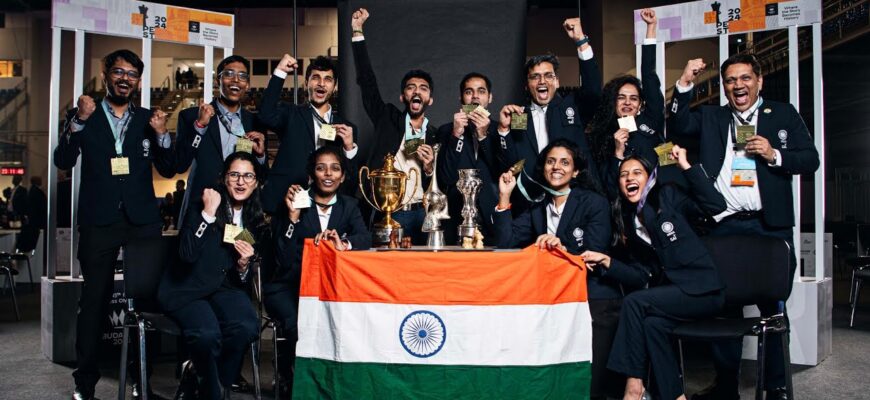The global chessboard has undeniably shifted, and the prevailing narrative now resounds with a phrase once uttered by the legendary Garry Kasparov: “The `children` of Vishy Anand are on the loose!” This declaration, initially marking Gukesh Dommaraju`s triumph at the 2024 Candidates tournament and then his subsequent World Championship victory against Ding Liren, has evolved from a keen observation into an undeniable reality. India, once personified by the singular brilliance of Viswanathan Anand, has become a veritable factory of Grandmasters, a nation now dictating the tempo of international chess.
A Legacy Unleashed: Anand`s Enduring Influence
For decades, Viswanathan Anand was the beacon, the solitary star shining brightly from India on the global chess stage. His unique blend of tactical brilliance and strategic depth captivated audiences and inspired a generation. What was less apparent at the time, however, was the profound, almost godfather-like influence he would exert on future talents. Anand didn`t just win; he cultivated. He provided mentorship, structure, and a living example of what was possible. The current wave of Indian prodigies, many of whom have literally received trophies from Anand himself in their younger years, are now fulfilling the promise of that mentorship, collectively transforming a solitary legacy into a pervasive phenomenon.
Gukesh: The Young King`s Fearless Ascent
Leading this charge is Gukesh Dommaraju, whose ascent has been nothing short of meteoric. His Candidates tournament victory, where he was the youngest participant and rated lower than five of his competitors, exemplified the audacious spirit of this new generation. He faced seasoned Grandmasters like Fabiano Caruana, Hikaru Nakamura, and Ian Nepomniachtchi without deference, dismantling their defenses with a calculated aggression. His World Championship match against Ding Liren further cemented this narrative. Where many might have sought a safe draw, Gukesh relentlessly pushed, demonstrating a profound disregard for conventional wisdom in pursuit of victory. This fearless approach, prioritizing winning over mere survival, is a hallmark of “Vishy`s children,” and it’s why the World Championship crown now rests on a very young Indian head.
Divya Deshmukh and the Women`s Revolution
The seismic shift isn`t confined to the open category. The FIDE Women`s World Cup in Batumi, Georgia, recently witnessed an all-Indian final, with Divya Deshmukh emerging victorious over compatriot Koneru Humpy. This wasn`t merely a personal triumph for Divya, who also earned her Grandmaster title in the process; it was a significant moment for the entire landscape of women`s chess. For over three decades, the women`s world championship scene had largely been a Chinese stronghold, with their players holding the title for a remarkable 25 out of 34 years. Divya`s win, achieved through sheer grit and an unwavering resolve to convert difficult endgames, signals a robust challenge to this long-standing dominance. Alongside Humpy and Vaishali, Divya is part of a formidable contingent poised to redefine women`s chess globally.
A Deep Bench of Diverse Talents
The depth of Indian chess talent extends far beyond these marquee names. The nation now boasts three players in the top six of the open FIDE standard ratings – Gukesh, R Praggnanandhaa, and Arjun Erigaisi – a numerical representation of dominance that few nations can rival. Additionally, four Indian women feature in the top 20 of their respective standard ratings. Players like Vidit Gujrathi and Aravindh Chithambaram are consistently knocking on the door of the top tier, further solidifying India`s collective strength.
Moreover, this generation displays diverse strengths. While Gukesh and Praggnanandhaa excel in classical chess, players like Arjun Erigaisi have demonstrated exceptional prowess in faster time controls, coming tantalizingly close to top honors at events like the World Rapid Championships and the recent eSports World Cup. Nihal Sarin, another rising star, is renowned for his blistering speed in online formats, constantly working to translate that edge to over-the-board success.
The Road Ahead: An Era of Sustained Excellence?
The implications of this surge are profound. The possibility of an all-Indian World Championship match, once a fantastical notion, is now a tangible prospect. Imagine the sheer audacity required to even conceive of such a scenario during Anand`s peak! Yet, in 2026, it could very well be a reality. This phenomenal rise is likely attributable to a confluence of factors: increased access to quality coaching and competitive play, the pervasive influence of online chess platforms, and perhaps most crucially, the living inspiration provided by Anand and the competitive fire fueled by their peers. It`s a self-sustaining ecosystem of excellence.
As Viswanathan Anand continues his hands-on role as a godfather to this remarkable generation, observing their relentless drive and collective dominance, one cannot help but borrow a line from another sporting arena: chess is unequivocally coming home – to India, that is.







